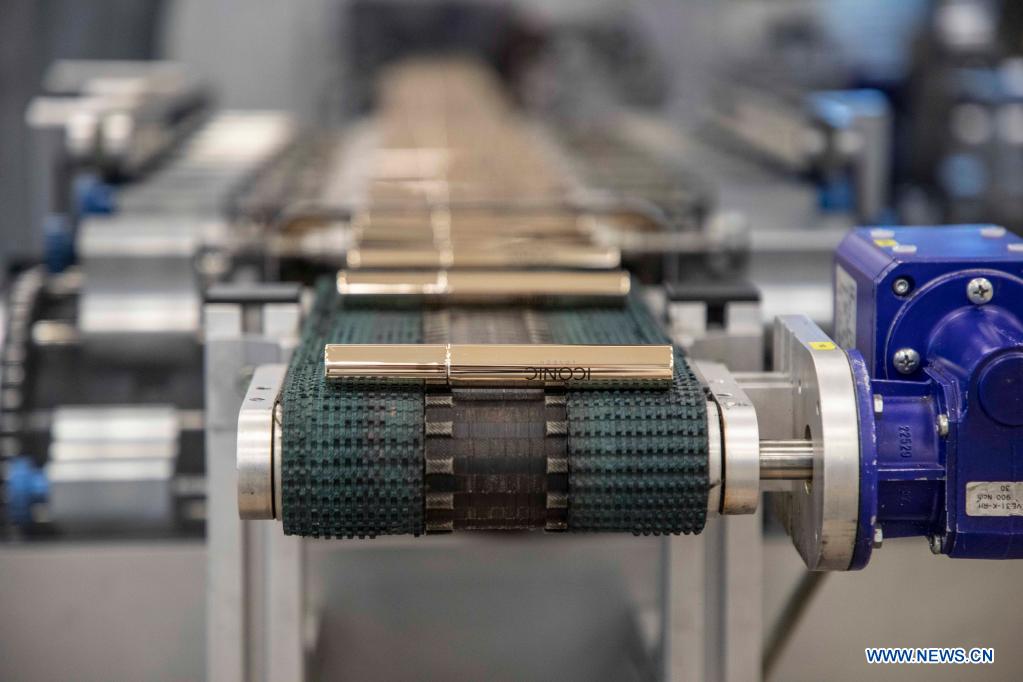
A photo taken on March 24, 2021 shows a production line at a cosmetics factory in Istanbul, Turkey. Erkul Cosmetics is one of Turkey’s leading companies specializing in the production of high-tech color cosmetics such as lip and eye makeup. The Turkish industry, which exports its products to more than 90 countries, mainly in the Balkans and European Union countries, is now looking to expand trade with China with products designed specifically for Chinese consumers. (Photo by Osman Orsal/Xinhua)
Zeynep Selmen
ISTANBUL, March 26 (Xinhua) — On a production line at a factory in Istanbul, Turkey, several robotic arms move with precision to stuff ingredients into small cases, close the lids, remove defective products and funnel them into output baskets.
“Here it is! The product is ready to use,” Ugur Adiyaman, export director of Erkul Cosmetics and a board member of the Istanbul Chemicals and Chemical Products Exporters Association (IKMIB), told Xinhua as he showed off a brand new box of mascara at the end of the queue.
Erkul Cosmetics is one of Turkey’s leading companies specializing in the production of color cosmetics, including lip and eye makeup products using advanced technology.
For Adiyaman, Turkey’s cosmetics and personal care products market is growing at an average of 10 percent per year thanks to its geographically rich and unique organization, dedicated research and development studies in the sector, and technologically advanced production facilities.
Turkish industry exports products to more than 90 countries, mainly to the Balkans and European Union countries, and is now looking to expand trade with China with products designed specifically for Chinese consumers.
IKMIB, with the support of the Ministry of Trade and the Turkish Exporters Association, launched the project a year ago to explore business opportunities in China.
“We will promote the concept of Turkish products in the best possible way through bloggers, vloggers and live promotions,” Adiyaman said about the advertising campaign that will soon be launched in China.
The Turkish team is currently researching what colours and packaging formats will be best suited to delight Chinese customers, as well as which products they will enjoy most.
Adiyaman said the main items exported to China are expected to be color cosmetics, wet wipes, perfumes, aerosol products, traditional Turkish cologne and hair care products.
According to him, Turkey’s diversity of endemic species and four-season climatic conditions provide excellent opportunities to obtain the best quality raw materials.
“We have rare plants whose essences are unique and strengthen our competitive advantage,” he said, mainly referring to Turkey’s world-famous rose water products and olive oil soaps.
“Rose water is one of the most important cosmetic products for us. With technological development, we have been able to produce 43 types of rose water-related products in the past three years,” Adiyaman said, noting that such products are very popular among Chinese people.
Meanwhile, Turkish industry representatives are keen to strengthen cooperation with Chinese e-commerce platforms such as Alibaba’s Tmall Global to seize more opportunities with Chinese companies.
In Adiyaman’s view, with the support of this project, many Turkish companies will open flagship stores, branches and rented warehouses in China.
According to statistics from the Turkish Exporters Association, total exports from Turkey’s cosmetics sector reached US$1.4 billion in 2020, up 15 percent from the previous year, despite the challenging circumstances of the COVID-19 pandemic.
“Even amid the tough circumstances of the COVID-19 pandemic, women never give up on personal care and continue to buy and apply lipstick even while wearing masks,” Adiyaman said.


